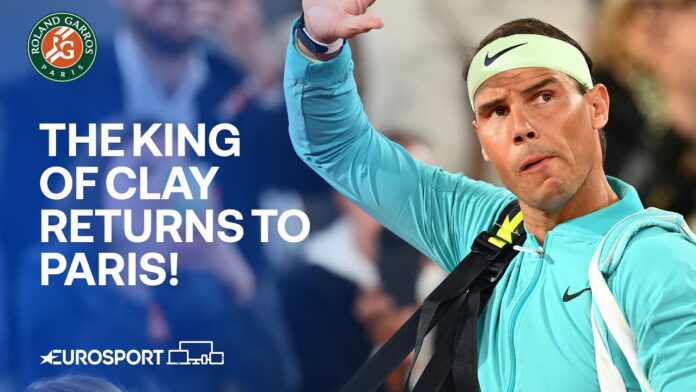After two decades of dominance, Rafael Nadal’s historic run at the French Open may have reached its end
Rafael Nadal’s love affair with Roland Garros has lasted almost two decades. If this was his final match at the French Open, the Spaniard leaves behind a legacy that will forever remain unmatched. His 6-3, 7-6 (7/5), 6-3 first-round loss to German fourth seed Alexander Zverev does not diminish his monumental achievements at the tournament.
Over nearly 20 years, Nadal claimed 14 French Open titles and amassed an incredible 112-4 win-loss record. His career at Roland Garros is a testament to his unmatched prowess on clay courts. Reflecting on his journey, the 37-year-old expressed his deep connection to the tournament. “It is so special to feel the love of the people in the place I love the most,” Nadal told fans. “All the memories every single year have been special and different.”
Nadal’s dominance on clay is legendary. He is both a once-in-a-lifetime player and a member of a generation that includes other tennis greats like Roger Federer and Novak Djokovic. However, where Federer and Djokovic excelled on grass and hard courts, Nadal mastered clay, becoming a physical and relentless force against elegant and powerful opponents.
Nadal’s fashion statement with Capri pants and muscle tops early in his career set him apart, showcasing his unique style. Renowned for his fitness, Nadal repeatedly outlasted opponents, grinding them down with his relentless play. His 112-4 record at the French Open will likely never be matched.
Some of Nadal’s finest moments include his five-set victory over Djokovic in the 2013 semifinals, prevailing 9-7 in the fifth set. Another highlight was his 2010 final win against Robin Söderling, who had defeated Nadal in 2009. Nadal’s ability to win the French Open at 19, becoming the youngest champion since Michael Chang in 1989, underscores his greatness.
Beyond clay, Nadal’s achievements on other surfaces are noteworthy. He won Wimbledon twice, in 2008 and 2010, demonstrating his versatility and ability to adapt. His ability to overcome adversity, including significant injuries and unproven drug allegations, adds to his legacy.
In his match against Zverev, Nadal showed resilience despite losing. He pushed the match past three hours, proving his enduring competitiveness. Todd Woodbridge’s commentary that Nadal “just needs more time” reflects the hope that Nadal might continue competing.
The crowd at Roland Garros, along with Zverev, acknowledged Nadal’s impact. Zverev, who will soon face trial for domestic violence charges, expressed his admiration for Nadal, highlighting the Spaniard’s influence on tennis.
Nadal’s potential farewell at the French Open contrasts with his dreams of competing at the 2024 Olympics in Paris. He aims to return to Roland Garros for the Games, seeking another chance at glory. However, staying healthy and raising his level will be crucial.
Nadal’s legacy at Roland Garros is secure, and his influence on tennis is profound. As he contemplates his future, fans and players alike will remember his contributions to the sport and his unmatched achievements on clay.
Analysis
Rafael Nadal’s potential departure from Roland Garros marks the end of an era in tennis, with significant implications across various perspectives.
Politically, Nadal’s career reflects the power of sports diplomacy. His international success has fostered positive relations between countries and brought attention to Spain’s sporting culture. Nadal’s influence extends beyond tennis, promoting values of perseverance and excellence.
Sociologically, Nadal’s dominance at the French Open represents the pinnacle of individual achievement in sports. His ability to inspire millions worldwide highlights the role of sports in shaping cultural identities and aspirations. Nadal’s journey from a young prodigy to a tennis legend underscores the importance of dedication and hard work.
Economically, Nadal’s success has had a substantial impact on the tennis industry. His presence at tournaments boosts ticket sales, viewership, and sponsorship deals. Nadal’s career has also contributed to the popularity of tennis in Spain, inspiring a new generation of players and fans.
From a gender perspective, Nadal’s career showcases the evolving role of male athletes in promoting equality and respect in sports. His humble demeanour and respectful conduct set a positive example, challenging toxic masculinity and encouraging sportsmanship.
Race and minority perspectives are crucial in understanding Nadal’s influence. As a Spanish athlete competing globally, Nadal represents diversity and inclusion in sports. His success challenges stereotypes and promotes a more inclusive view of athletic excellence.
Psychologically, Nadal’s career offers valuable lessons in resilience and mental fortitude. His ability to overcome injuries and setbacks demonstrates the importance of mental strength in achieving success. Nadal’s journey inspires individuals to persevere through challenges and maintain a positive outlook.
Nadal’s legacy at Roland Garros is a testament to his exceptional talent and determination. His potential farewell from the French Open marks a significant moment in tennis history, with far-reaching implications. As Nadal contemplates his future, his influence on the sport and his legacy as one of the greatest players of all time remains unparalleled.
